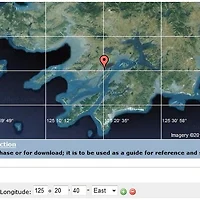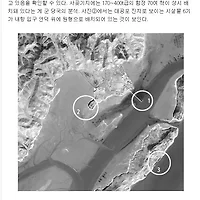Type-B Submersible Infiltration Landing Craft (SILC)

Dimensions: L 9.3m, W2.54, Displacement: 5 tons (est)
Speed: 30-40 kts surfaced; 12kts semi-submerged (est)
Range: 300nm surfaced (est)
Compliment: 3 (2x crew, 3 pax)
Armament: small arms
The first submersible infiltration craft was captured in 1983 by South Korean forces. The boat is launched from a mother ship as per the High Speed boat above, and approaches the coast at high speed. Close to the shore where radar/visual detection is most likely, the boat floods a compartment under the long foredeck and sinks to the point that the deck is awash and only the cabin is exposed.
The passengers reach the shore by swimming.
“Type-B” is not a North Korean designation. An improved version of the Type-B is reported with the cabin divided into two separate structures, one over the bridge and one over the passenger compartment. This arrangement is apparently intended to reduce the radar cross-section during the semi-submerged phase of the mission:

Type-C (SP-10H) Submersible Infiltration Landing craft (SILC)

Dimensions: L 9.3m, W2.54m, Displacement : 5 tons
Speed: 30-40 kts surfaced; 12kts semisubmerged
Range: 300nm surfaced
Compliment: 6 (2x crew, 4 passengers)
Armament: small arms
Captured during an infiltration mission in South Korea, this boat is generally the most widely reported and pictured example, but it’s generally only a minor variation on the Type-B.
Type-D Improved-SILC

Dimensions: L 12.8m, W2.95m, Displacement: 10.5 tons
Machinery: 3x 250 or 260 hp V8 (Johnson/OMC, etc)
Speed: 40-50kts surfaced, 4-6 kts submerged
Range: 200nm
Diving Depth: 3m snorkeling, 20 m maximum
Crew: 8 (4x crew, 1-2 escorts, 1-3 infiltrators)
Radar: Japanese made Furuno 1830
Armament: small arms
The I-SILC is fully submersible (i.e. a submarine) but approaches the shore at high speed on the surface like previous SILC. However, it can run almost fully submerged 3m below the surface with only the snorkel mast above the surface (the larger mast towards the rear of the boat). When not in use the snorkel folds aft to reduce the silhouette and radar signature.
In an emergency the boat can submerge completely to a depth of 20m (some sources say 25m) to avoid detection, but when fully submerged it cannot travel forward because it lacks electric motors.
'북한-군사-위성사진' 카테고리의 다른 글
| YTN, 천안암등 북 반잠수정 대응위해 출동 (0) | 2010.03.31 |
|---|---|
| 천안함 침몰전후, 사곶기지 잠수정 기동 확인 (0) | 2010.03.31 |
| 북한 공군기지 [정밀 좌표] 위성으로 들여다보니 (0) | 2010.03.30 |
| 북한 '사곶기지'는 어떤 곳 : 위성사진으로 들여다보니 (0) | 2010.03.30 |
| 해경주장 첫 조난지점은 해안선서 7백미터 지점 (0) | 2010.03.29 |

